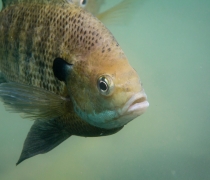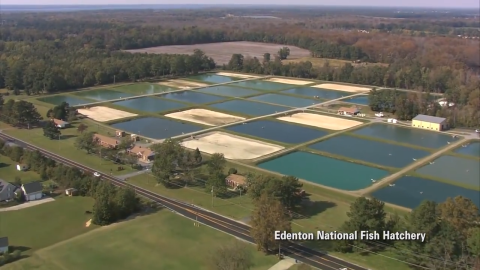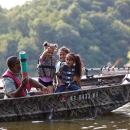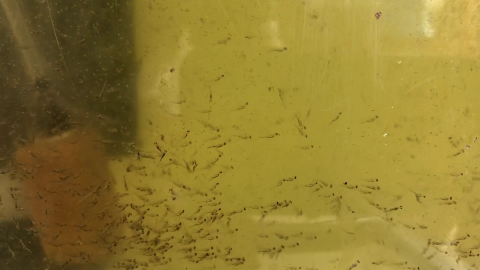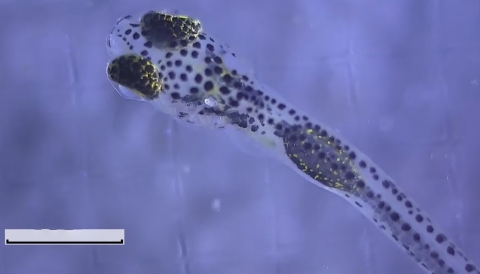Visit Us
While in Edenton, venture to the largest striped bass producer in the entire National Fish Hatchery System. Come visit our public aquarium to see local aquatic animals. Hike around our striped bass production ponds and to our boardwalk on Pembroke Creek. In the summer months, you may be able to see thousands of lake sturgeon in one of our holding houses.
Location and Contact Information
About Us
Since 1871, National Fish Hatcheries have been applying science-based approaches to conservation challenges. We work with our partners and engage the public to conserve, restore, and enhance fish and other aquatic resources for the continuing benefit of the American people. Conservation is at the heart of what we do, and we recognize that we do this work for the American people–both the present generation who benefit today and future generations who will inherit our legacy of conserving America’s aquatic resources.
Edenton National Fish Hatchery was initially established to supplement the populations of American shad, which had been overfished in the 1800s. The hatchery has produced blueback river herring, largemouth bass, bluegill, channel catfish, white perch, and many other species over its long history. Edenton National Fish Hatchery continues to produce fish for public use and restoration as it has for well over a century.
Tours
Self-guided tours are available for individuals and small groups.
We offer tours to large groups seasonally and by appointment only. Please email Sam_Pollock@fws.gov to inquire about tour availability.
What We Do
Staff from Edenton National Fish Hatchery have spawned and raised Atlantic striped bass for release into local waters around the time of the Wright brothers’ first flight. In the early years, the hatchery released millions of larval fish. Although the hatchery was initially established to increase the numbers of American shad, the hatchery was quickly expanded to spawn Atlantic striped bass and stock the resulting larval fish. As hatchery staff improved production methods, we have been able to stock older striped bass. In the last 6 years, the hatchery staff have released a total of over 1 million 6-8 month old fish, the most for that size/age of any Atlantic striped bass hatchery in the US. Anglers have caught our hatchery’s striped bass from Cape Hatteras, North Carolina to Maine.
The hatchery raised many additional species over the years such as large mouth bass, bluegill, river herring, mosquito fish, redear sunfish, and channel catfish. In recent years, another focus of the hatchery has been restoration programs. Since 2014, the hatchery has released over 30 thousand lake sturgeon into the Tennessee River or its tributaries (including the French Broad River in western North Carolina) as part of a multiagency restoration program. In support of endangered freshwater mussels, the hatchery has successfully cultured a host fish, the white shiner. In addition, the hatchery staff have begun efforts to rear endangered Cape Fear shiners. In 2020, hatchery staff have added gopher frogs to their list of conservation programs.
Our Organization
Our Species
Edenton National Fish Hatchery raises fish and other aquatic animals. Our two largest programs are Atlantic striped bass and lake sturgeon. We raise white shiners , Johnny darters and Cape Fear shiners for conservation purposes. We have recently expanded our conservation programs to include gopher frogs
Get Involved
Edenton National Fish Hatchery is recruiting interns for the spring, summer, and fall production seasons. Up to two volunteer interns are being sought to cover all or part of each season. Interns may serve multiple seasons. Interns will work a 40 hour week with a minimum commitment of 2 months (prefer 3 months). Interns will learn fish culture skills and other duties performed at warm water fish hatcheries. If you would like more information on the internship, please email sonia_mumford@fws.gov. If you are interested in applying, please send a cover letter (including your available dates), resumé and two references to sonia_mumford@fws.gov. The deadline for the Spring/Summer internships is December 1 prior to the intended Spring/Summer internship. The deadline for the Fall internship is July 20th prior to the intended Fall internship.
Projects and Research
In cooperation with our partners, we are committed to improving upon the methods we use for all of our programs. Here are a few examples:
Hatchery staff are conducting feed trials to determine whether a commercially available sturgeon feed will be a viable alternative to primarily feeding a frozen insect larvae.
We are exploring different ways to feed early life stages of striped bass.
Staff are also investigating methods to breed white and Cape Fear shiners in captivity.
And, we are testing different methods of raising gopher frogs. As part of our headstarting program, our frogs are tagged with a tag that glows under a black light. When one of our frogs is re-captured, biologists will be able to identify it as a graduate of our program!

